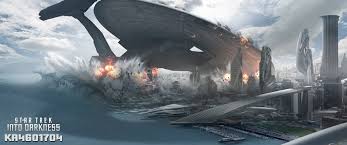Star Trek: Into Darkness (10 September 2013)
 Movieetos Rating (Movie Cheetos)
Movieetos Rating (Movie Cheetos)




(100% Movieetos)
In honor of the DVD Release of Star Trek: Into Darkness, our 100YSS Scientist and movie critic, Dr. Ronke Olabisi provides her scientific perspective on the latest J.J. Abrams’ Star Trek installment.
[SPOILER ALERT]
When I was a kid, I hated my vegetables and if left to my own devices would have subsisted entirely on a diet of Kool-Aid, ice cream (preferably the kind delivered by a truck), and any food produced by Hostess, Lays’ or McDonald’s. Similarly, when I was a kid I had a disdain for black and white movies and if left to my own devices would have watched nothing but Flash Gordon on repeat. Fortunately, restaurants offer alternatives to junk food in the form of delicious 4 star meals. These are better tasting and infinitely better for you than junk food. In the same way, film variety offer alternatives to crappy science fiction movies: a broken television forced me to watch the black and white classic, The Day the Earth Stood Still. That 4-star science fiction movie left my childhood self inspired and thinking about how not politics but science might bring about world peace.
Star Trek: into Darkness is science fiction junk food. In a brilliant review by Threat Quality Press, Into Darkness is likened to Cheetos: enjoyable when going in, but completely devoid of any substance. If the original Wrath of Khan was lasagna, Into Darkness is lasagna-flavored Cheetos. After exiting the movie, I overheard a man saying to his wife, “No, it was different. Nobody expects them to kill the captain. The second in command? Maybe. And Spock was still dead at the end of that movie.”
He was right. In a time where sequels were not a guarantee, we who suffered as Spock died at the end of Wrath of Khan had no idea he would return in the subsequent film — we hoped, but we did not know. The emotional weight was palpable as we too wanted to scream “Khaaaan!!!” as Kirk did at the end of Wrath of Khan. Watching Kirk helplessly watch his friend die — his best friend of 20+ years — was crushing. Spock was alone, blind, and when he put his hand against the glass, we knew he couldn’t see Kirk reaching to touch that hand; we watched Kirk completely powerless to give any sort of comfort. If it is a horrible thing to watch your friend die in your arms; it is worse to watch your friend die within arm’s reach. This was crushing to watch for any fan of the series. In the reboot, however, Kirk and Spock are not longtime besties. In fact, they hated each other in the first movie. So much so, that Spock actually beams Kirk to a desolate and pretty dangerous planet to be rid of him. Hence, it didn’t quite ring true that Spock would now be so moved by Kirk’s death that he would put on the waterworks, particularly since in the first movie when Spock’s own mother died right in front of him he didn’t shed a single tear.
Aside from Spock, we are not moved by Kirk’s death — we know McCoy is going to have zombified the Tribble and will now do so with Kirk. Not to rehash Threat Quality Press’ review, but they raise the very salient points that original Khan was introduced in the 60s as an Indian man (played by a Mexican actor, a big deal back then) who was ostensibly their imagined 90s achievement of the master race.
He was stronger, yes, but he was also smarter, well versed in literature, philosophy, science, the arts and debate.
It was a statement that this epitome of the master race looked like nothing Hitler had in mind, though Kirk did. In their final showdown, the militaristic Khan attempts a suicide mission — destroying his own ship and everyone on board simply to defeat Kirk. This was the old way of humanity. In the new way, Spock sacrifices himself to save everyone on board. Thus, Khan may be stronger and smarter, but he is not better. The original Wrath of Khan shows that we are not individually perfect, but we have evolved. Our way, in which we sacrifice to save rather than to kill is better than the old way that Khan represents. Obviously in our time of suicide bombers, this is still apropos today... and a sentiment completely missing from Star Trek: Into Darkness. Benedict Cumberbatch’s whiteness would have fit Hitler’s ideals, so whatever statement that was once there is now lost. Khan is not the well-learned sophisticate from before — he doesn’t quote literature at all; in fact, he is more like Wolverine of the X-men than Khan of Star Trek in his mutant-like strength and regeneration. And the bad guys are no longer remnants of the past: in trying to murder his own, Admiral Marcus is as much of a psychopath as Khan is. And thus, the whole “we have evolved” theme is lost. So what is JJ Abrahams trying to say?
The Den of Geek also tackled the junk-food-ification of today’s science fiction movies. They argue that this began with Independence Day. Independence day is to science fiction as McDonald’s is to burgers. It’s convenient, appeals to the masses, and even though it’s not as good as a gourmet burger, the formula is easily replicable: senseless destruction on a large scale + gratuitous and unnecessary female semi-nudity = box office gold.
Witness the formulas:
- Independence Day: slow blow up of white house + stripper fiancée.
-
Star Trek (the first by Abrahams): slow blow up of Vulcan + Kirk in bed with some green woman.
- Star Trek Into Darkness: Khan crashes ship (shown slowly) into San Francisco + Admiral’s daughter in lingerie.
Okay, so we get the formula. The message: that’s easy, Abrams spells it out for us in the end by dedicating the film to the 911 victims. Because those terrorists crashed into buildings in New York and Khan crashed into buildings in San Francisco, so it’s the same, right? Wrong, JJ. Wrong. If you are going to dedicate something to victims of a tragedy, it seems like it would be better to dedicate the best lasagna you had ever tasted than to the newest lasagna-flavored Cheetos you rolled out. Otherwise, instead of making an important film to dedicate to the fallen, it rings as though one is trying to make a film important by dedicating it to the fallen, which is just wrong on so many levels. So, in all of this badness, can we at least have good science, even if it’s fictional science? No. No you can’t.
- In the beginning of the movie, Spock almost dies because they’re trying to save the lives of these primitive spear-chucking natives by deploying an anti-volcanic eruption fusion/fission/hand-wave device. The Enterprise has to hide underwater for this to happen (?) so they won’t inadvertently reveal themselves to the natives. Also, because the volcano is about to erupt, they can’t use transporters unless they are directly over the volcano. So they fly Spock over in a shuttle (which the natives don’t notice), drop him into the volcano where he deploys the device, then can’t get him back. Based on all the rules they set up, they should have been able to do all of this from orbit. Or you know how you don’t always see planes that are pretty high up in the air, even though they’re not in orbit? I suspect this may have worked too. In fact, I suspect that it would have been easier to hide at altitude than to get the Enterprise underwater right next to the native’s home without the natives noticing. And once the volcanic-eruption suppression device goes off, it is unclear why Spock mightn’t have survived, since it seemed like it pretty much stopped all eruptions as they were happening in what I would have likened to a “freezing” process rather than venturing into the fusion/fission language. I get why Spock would die in a regular volcanic eruption, but the one portrayed in the film seemed more like the rearrangement that happened in the North Pole when superman did some redecorating with dad’s crystal: maybe Spock would get a concussion if he was standing right on top of one of the solid lava-columns that erupted.
-
Khan gets away by beaming from his crashing ship to the Klingon planet Kronos. So, they risk war by flying the Enterprise to the neutral zone to fire on the planet. Because landing on the planet would cause a war, but firing with these super-stealth photon torpedoes would not, because the torpedoes are untraceable. Okay, I had a similar thought process when I was 7 and threw rocks at a wasps’ nest. The wasps pretty quickly figured out that the rocks weren’t coming from nowhere but were coming from me. I hazard to guess that the Klingons might have suspected the only non-Klingon ship in the area of being responsible for these untraceable weapons. So, instead of this plan, why not just beam a stealth team to Khan’s location? Oh yeah, something’s wrong with the transporters. Let’s fly a shuttle down.
-
During the scene where the Enterprise is falling towards Earth, someone yells that if they don’t get the engines up, they’ll burn up in the atmosphere. This does not make sense because the Enterprise was never in orbit. Remember that guy who parachuted to the Earth from space? Remember how he notoriously did not burn up? Yeah, same idea. Speeds required to maintain orbit are so high that when an object enters the atmosphere at that speed, the “friction” between the atmosphere and the ship causes heating. Like skipping a rock across a lake - the more horizontal speed it has, the more it skips. Each skip slows it down with drag, like “friction.” When you drop a rock into a lake, there is no skipping. No horizontal speed. Much less friction.
-
In the previous film, Spock’s mother dies because they can’t beam a moving target. And she falls pretty slowly from a cliff right when she’s about to be beamed to safety. But when Khan’s ship is flailing all over the place, he beams away safely. When Admiral Marcus’ daughter tries to run away from the transporter beam, her attempts to escape are ineffective. So, transporter technology only works for the bad guys.
So, did I enjoy the movie? Sure, I love Cheetos. Would I watch it again? No, there’s plenty more Cheetos out there. I have watched the original Wrath of Khan multiple times, and no doubt will multiple more. There is a market for movie-Cheetos: Movieetos. I enjoy Movieetos. But I truly love science fiction films with substance, and would loathe to see them replaced in entirety with these.
 Movieetos Rating (Movie Cheetos)
Movieetos Rating (Movie Cheetos)


